2018/July New 70-761 Exam Dumps with PDF and VCE Free Updated Today! Following are some new 70-761 Real Exam Questions:
1.|2018 Latest 70-761 Exam Dumps (PDF & VCE) 171Q&As Download:
https://www.braindump2go.com/70-761.html
2.|2018 Latest 70-761 Exam Questions & Answers Download:
https://drive.google.com/drive/folders/0B75b5xYLjSSNZG9yTW9reVdkZG8?usp=sharing
QUESTION 136
Note: This question is part of a series of questions that present the same scenario. Each question in the series contains a unique solution that might meet the stated goals. Some question sets might have more than one correct solution, while others might not have a correct solution.
After you answer a question in this section. You will NOT be able to return to it. As a result, these questions will not appear in the review screen.
You create a table named Products by running the following Transact-SQL statement:
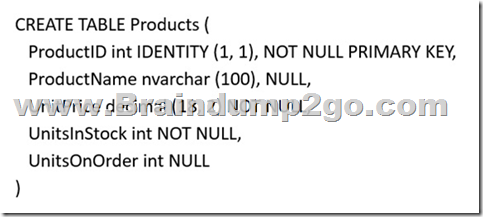
You have the following stored procedure:
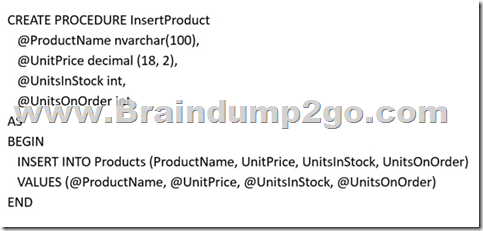
You need to modify the stored procedure to meet the following new requirements:
Insert product records as a single unit of work.
Return error number 51000 when a product fails to insert into the database.
If a product record insert operation fails, the product information must not be permanently written to the database.
Solution: You run the following Transact-SQL statement:
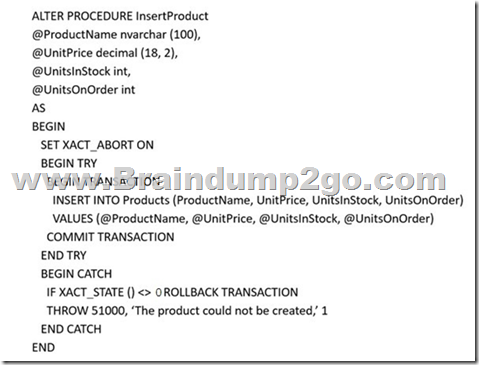
Does the solution meet the goal?
A. Yes
B. No
Answer: B
QUESTION 137
Note: This question is part of a series of questions that present the same scenario. Each question in the series contains a unique solution that might meet the stated goals. Some question sets might have more than one correct solution, while others might not have a correct solution.
After you answer a question in this section. You will NOT be able to return to it. As a result, these questions will not appear in the review screen.
You create a table named Products by running the following Transact-SQL statement:
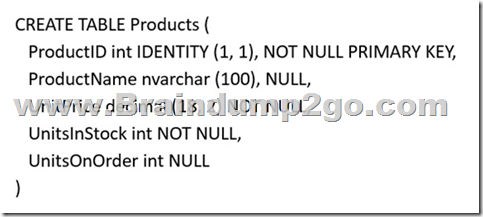
You have the following stored procedure:
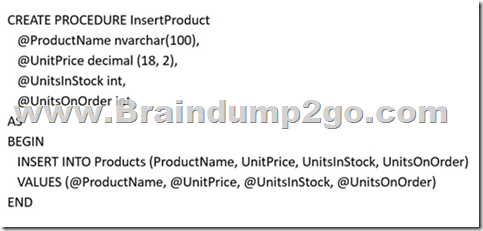
You need to modify the stored procedure to meet the following new requirements:
Insert product records as a single unit of work.
Return error number 51000 when a product fails to insert into the database.
If a product record insert operation fails, the product information must not be permanently written to the database.
Solution: You run the following Transact-SQL statement:
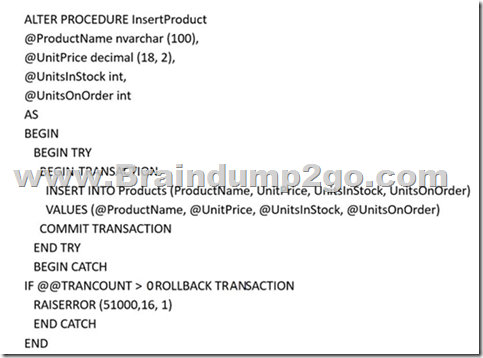
Does the solution meet the goal?
A. Yes
B. No
Answer: B
QUESTION 138
You have a database that contains the following tables:
Customer

CustomerAudit

Where the value of the CustomerID column equals 3, you need to update the value of the CreditLimit column to 1000 for the customer. You must ensure that the change to the record in the Customer table is recorded on the CustomerAudit table.
Which Transact-SQL statement should you run?
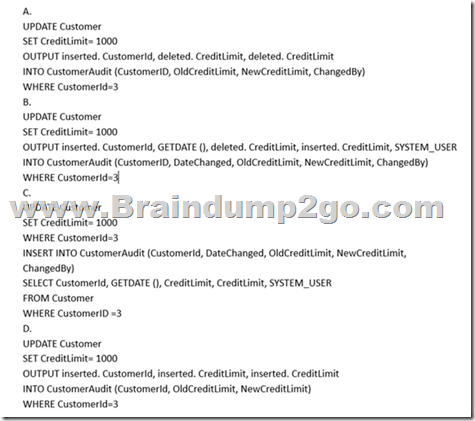
A. Option A
B. Option B
C. Option C
D. Option D
Answer: C
QUESTION 139
You have a database for a banking system. The database has two tables named tblDepositAcct and tblLoanAcct that store deposit and loan accounts, respectively. Both tables contain the following columns:
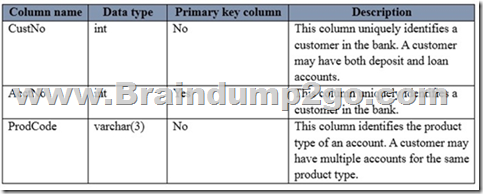
You need to determine the total number of customers who have only deposit accounts.
Which Transact-SQL statement should you run?
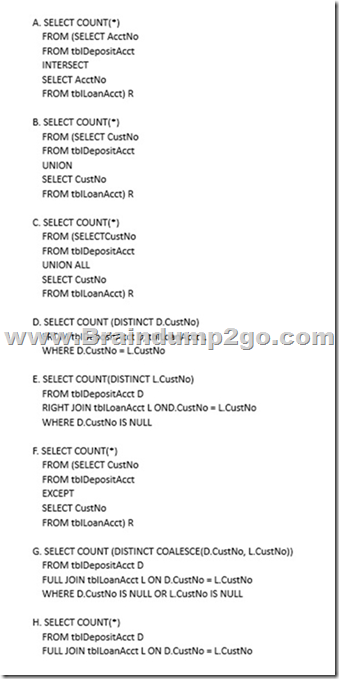
A. Option A
B. Option B
C. Option C
D. Option D
E. Option E
F. Option F
G. Option G
H. Option H
Answer: F
Explanation:
https://docs.microsoft.com/en-us/sql/t-sql/language-elements/set-operators-except-and-intersect-transact-sql?view=sql-server-2017
QUESTION 140
Note: This question is part of a series of questions that present the same scenario. Each question in the series contains a unique solution that might meet the stated goals. Some question sets might have more than one correct solution, while others might not have a correct solution.
After you answer a question in this section. You will NOT be able to return to it. As a result, these questions will not appear in the review screen.
You have a table named Products that stores information about products your company sells. The table has a column named ListPrice that stores retail pricing information for products.
Some products are used only internally by the company. Records for these products are maintained in the Products table for inventory purposes. The price for each of these products is $0.00. Customers are not permitted to order these products.
You need to increase the list price for products that cost less than $100 by 10 percent. You must only increase pricing for products that customers are permitted to order.
Solution: You run the following Transact-SQL statement:
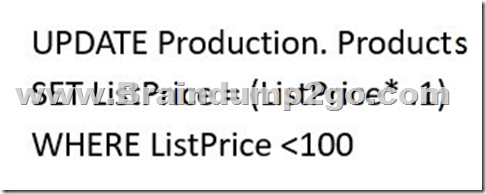
Does the solution meet the goal?
A. Yes
B. No
Answer: B
Explanation:
Mathematical equation will only return 10 % of the value.
QUESTION 141
Note: This question is part of a series of questions that present the same scenario. Each question in the series contains a unique solution that might meet the stated goals. Some question sets might have more than one correct solution, while others might not have a correct solution.
After you answer a question in this section. You will NOT be able to return to it. As a result, these questions will not appear in the review screen.
You have a table that was created by running the following Transact-SQL statement:
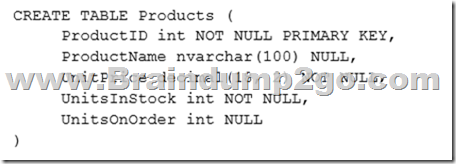
The Products table includes the data shown in the following table:

TotalUnitPrice is calculated by using the following formula:
TotalUnitPrice = UnitPrice * (UnitsInStock + UnitsOnOrder)
You need to ensure that the value returned for TotalUnitPrice for ProductB is equal to 600.00.
Solution: You run the following Transact-SQL statement:

Does the solution meet the goal?
A. Yes
B. No
Answer: B
QUESTION 142
Note: This question is part of a series of questions that present the same scenario. Each question in the series contains a unique solution that might meet the stated goals. Some question sets might have more than one correct solution, while others might not have a correct solution.
After you answer a question in this section. You will NOT be able to return to it. As a result, these questions will not appear in the review screen.
You create a table named Customer by running the following Transact-SQL statement:
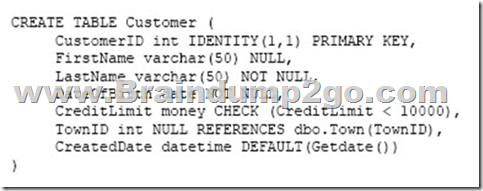
You must insert the following data into the Customer table:

You need to ensure that both records are inserted or neither record is inserted.
Solution: You run the following Transact-SQL statement:

Does the solution meet the goal?
A. Yes
B. No
Answer: B
Explanation:
https://docs.microsoft.com/it-it/sql/t-sql/statements/insert-transact-sql?view=sql-server-2017
QUESTION 143
Note: This question is part of a series of questions that present the same scenario. Each question in the series contains a unique solution that might meet the stated goals. Some question sets might have more than one correct solution, while others might not have a correct solution.
After you answer a question in this section. You will NOT be able to return to it. As a result, these questions will not appear in the review screen.
You have a database that contains a single table named tblVehicleRegistration. The table is defined as follows:

You run the following query:

The query output window displays the following error message: “Conversion failed when converting the varchar value ‘AB012’ to data type int.”
You need to resolve the error.
Solution: You modify the Transact-SQL statement as follows:

Does the solution meet the goal?
A. Yes
B. No
Answer: B
Explanation:
https://docs.microsoft.com/en-us/sql/t-sql/functions/cast-and-convert-transact-sql?view=sql-server-2017
QUESTION 144
Note: This question is part of a series of questions that present the same scenario. Each question in the series contains a unique solution that might meet the stated goals. Some question sets might have more than one correct solution, while others might not have a correct solution.
After you answer a question in this section. You will NOT be able to return to it. As a result, these questions will not appear in the review screen.
You have a database that contains a single table named tblVehicleRegistration. The table is defined as follows:

You run the following query:

The query output window displays the following error message: “Conversion failed when converting the varchar value ‘AB012’ to data type int.”
You need to resolve the error.
Solution: You modify the Transact-SQL statement as follows:

Does the solution meet the goal?
A. Yes
B. No
Answer: B
QUESTION 145
Note: This question is part of a series of questions that present the same scenario. Each question in the series contains a unique solution that might meet the stated goals. Some question sets might have more than one correct solution, while others might not have a correct solution.
After you answer a question in this section. You will NOT be able to return to it. As a result, these questions will not appear in the review screen.
You have a database that contains a single table named tblVehicleRegistration. The table is defined as follows:

You run the following query:

The query output window displays the following error message: “Conversion failed when converting the varchar value ‘AB012’ to data type int.”
You need to resolve the error.
Solution: You modify the Transact-SQL statement as follows:

Does the solution meet the goal?
A. Yes
B. No
Answer: B
QUESTION 146
Note: This question is part of a series of questions that present the same scenario. Each question in the series contains a unique solution that might meet the stated goals. Some question sets might have more than one correct solution, while others might not have a correct solution.
After you answer a question in this section. You will NOT be able to return to it. As a result, these questions will not appear in the review screen.
You have a table named Products that stores information about products your company sells. The table has a column named ListPrice that stores retail pricing information for products.
Some products are used only internally by the company. Records for these products are maintained in the Products table for inventory purposes. The price for each of these products is $0.00. Customers are not permitted to order these products.
You need to increase the list price for products that cost less than $100 by 10 percent. You must only increase pricing for products that customers are permitted to order.
Solution: You run the following Transact-SQL statement:

Does the solution meet the goal?
A. Yes
B. No
Answer: A
Explanation:
https://docs.microsoft.com/en-us/sql/t-sql/queries/update-transact-sql?view=sql-server-2017
!!!RECOMMEND!!!
1.|2018 Latest 70-761 Exam Dumps (PDF & VCE) 171Q&As Download:
https://www.braindump2go.com/70-761.html
2.|2018 Latest 70-761 Study Guide Video: